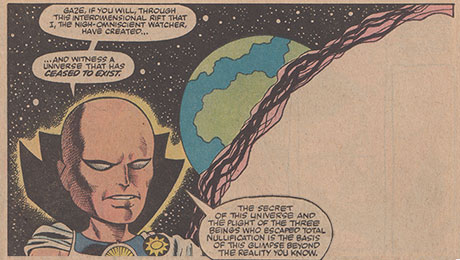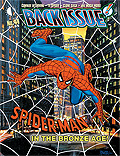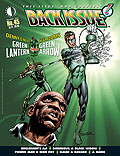Star Trek Harlan Ellison's The City on the Edge of Forever The Original Teleplay
Original Teleplay: Harlan Ellison
Adaptation By: Scott Tipton and David Tipton
Art by: J.K. Woodward
Covers by Juan Ortiz and Paul Shipper
Karen: Back in August I reviewed what many consider to be the finest episode of Star Trek ever made, "City on the Edge of Forever." In that post I discussed that there were huge differences between author Harlan Ellison's story, and the resulting final episode. The changes that were made in Ellison's story had nothing to do with quality of the writing -the show's staff all agreed that the script was brilliant -but it was felt that it veered too far from the established norms of the show.
Karen: Ellison's original story has been published since the episode aired, so fans have had a chance to read it for themselves. But of course, we've never been able to see what it would have looked like if the episode had been produced using his script -until now. In 2015, IDW, with Ellison's blessing and assistance, produced a mini-series that told Ellison's story in five issues, and this was collected in a very nice hardback, which is what I used for this review.
Karen: The art in this book is by J.K. Woodward, who I profess I have never heard of before, but seeing as how I don't regularly buy comics now, that's no slight on him. Woodward utilizes a painting method, similar to Alex Ross, who, based on comments around here, folks seem to either love or hate -I'm in the love camp. I also appreciate Woodward's style. He captured the spirit of the show well. There were times when clearly he was working from photographs of the actors, and while it was obvious, I didn't mind really - it wasn't distracting to me, except a couple of times. When he was depicting characters who were not regulars on the show, such as the story's antagonist, Beckwith, the character's appearance seemed perhaps less defined. I think it was a smart decision to depict Kirk and Spock in the same clothes they wore in the episode. In the notes in the back, Scott Tipton says this was a conscious decision to both provide familiarity and present the story as if it were an alternate version of the filmed episode. Juan Ortiz and Paul Shipper both provided covers for the individual issues and they are reproduced in the book. Ortiz created the brilliant Star Trek: The Art of Juan Ortiz poster book a few years ago.
Karen: The story reads quite well, and from what I can gather, the Tiptons essentially translated Ellison's work to the comic page. They've done a fine job. It is engaging, thoughtful, and more lyrical than the actual episode. I've read a couple of collections of Ellison's short stories. I've enjoyed his work and I've always felt he brought a quality of surrealism to his stories. It is the same here, particularly in the depiction of the actual 'city on the edge of forever,' which combines elements that seem purely dreamlike with the more realistic science fiction setting of Trek. In the episode, the Guardian of Forever is a strange, oval-shaped entity, neither being nor machine -or maybe both; here, in the original story, there are multiple Guardians, tall, bearded men, ancient, drained of color, who almost seem to be a part of the icy mountains surrounding them. Could this have worked on the show? I don't know. It seems almost too fantastic. Why is it easier to accept a lop-sided donut than nine-foot tall men? Perhaps it is simply my bias from seeing the televised episode so many times.
Karen: The instigating point of the story is completely different here than in the episode. In the show, McCoy accidentally injects himself with a drug, cordrazine, which causes him to go temporarily insane. He beams down to the planet below them, from which they have been monitoring time disruptions. It is McCoy's departure into the past and his actions there that cause the timeline to change drastically. In Ellison's original story, an officer named Beckwith, who has been dealing drugs on board the Enterprise, flees after another officer threatens to turn him in, and Beckwith kills him. I have to admit, I can understand why this was changed for the show. Given how the crew was portrayed, and the general standards set forth by the network, I don't see how this was going to work in any case. But here, taken as the idea of almost an alternate universe (a Star Trek What If? perhaps) it's intriguing to consider.
Karen: Another major divergence between the two stories occurs after Beckwith jumps through the Time Vortex, altering reality. The landing party beams back up to what they think is The Enterprise, only to find that they are aboard The Condor, a pirate ship! They fight off the pirates and secure the transporter room, and leave Yeoman Rand in charge -yes, you read that right -with Kirk and Spock beaming back down, to convince the Guardians to let them go back to try to fix things. This entire sequence was excised from the script for the episode, it seems chiefly due to expense. It's interesting that Ellison provided a much more capable representation of Rand. Of course, by the time the story was filmed, Grace Lee Whitney was no longer a part of the cast.
Karen: One of the things that became quite apparent reading this book was how different Edith Keeler was in the original story. She's still appealing, but she seems to have a little less iron to her spine here. There are a couple of scenes from the episode that stand out which aren't in the original story: the one where Edith confronts Kirk and Spock in the basement, and the speech (however corny it might be) that she gives in the mission. In fact, in the episode, she is shown several times in the mission, and it gives us a sense of her devotion to her cause. Here, we see her speaking to groups of people but mostly we see her with Kirk, and the focus is more on how he is affected contemplating her loss. In this case, I felt that the episode provided her with more of a voice.
Karen: But Kirk's sense of impending doom is just as real here. Although Ellison has Kirk and Spock arrive at their discovery of Keeler's importance, and her fate, through somewhat bizarre fashion, Kirk's desire to be with Edith is tangible. In a discussion with Spock over Edith's role as a catalyst, the Vulcan presses his Captain, as he senses that he is becoming too involved with this woman, who must die for their future to live. The Kirk we see here is far more alone than the solitary figure we saw in the first season of the show; so much so he even contemplates bringing Edith forward in time! But Spock tells him that Edith must die in order to preserve the future. The sequence is portrayed by Woodward in black and white, as Kirk is recalling it from memory, and it heightens the drama of the exchange.
Karen: Spock is able to calculate where and when Beckwith will appear, but they make a mess of catching him. Kirk enlists the aid of a disabled World War One veteran called Trooper (drawn to resemble Ellison) to be on the lookout for Beckwith. After some time (it is difficult to tell exactly how much -a couple of days?) Trooper comes back with information that Beckwith is hiding out in a back alley. Kirk and Spock go after him, but again fail to catch him -and he uses a phaser and disintegrates Trooper. Either later, or another night, Edith is again speaking on a corner, trying to inspire hope in the downtrodden. Spock speaks admiringly of her. Edith finishes and sees them, and crosses the street to join them. But she doesn't notice a truck coming down the street. Kirk and Spock realize that this is it: the moment of her death. Suddenly Beckwith appears on the opposite side of the street. He too sees the truck barreling down towards her. Amazingly, Beckwith runs into the street, to save Edith. Kirk staggers forward, torn about what to do. But Spock races out and tackles Beckwith, preventing him from saving Edith. She turns, too late, as Kirk can only watch in horror as she is struck by the vehicle.
Karen: This is just as gut-wrenching as it was on the show. Woodward clearly used Shatner's expression from these scenes for his art in the book. The way this was resolved in Ellison's story versus the finished product was a bone of contention between the two camps for many years as I understand it. I have to say, I find the episode more compelling, for a few reasons. In the show, Kirk not only doesn't save Edith, he is responsible for preventing McCoy from saving her. He is the decision maker; the ultimate responsibility for what happens falls on his shoulders, not Spock's. I think this makes Edith's death and Kirk's grief even more tragic, as he knows his direct action resulted in the death of the woman he loved. Also, having McCoy be the potential rescuer for Edith allows for a real dramatic impact. When the three men are reunited on the steps of the mission, it's pure joy, but only for a few fleeting seconds, as Edith's fate is imminent. McCoy's angry reaction, when Kirk restrains him, is also powerful.
Karen: But does it need it? As it stands, it focuses much more squarely on Kirk's sacrifice -his sacrifice of Edith, his love, his potential happiness, to restore reality. The episode is strong without it. But the original story, which has a slightly different emphasis, and some alternate twists and turns, is certainly worth exploring. I could see that this might have been an excellent Outer Limits actually - although probably cost prohibitive but it would have worked just as well if trying to get across the idea of man's duality rather than focus on one man's tragedy.
Karen: On a somewhat related thought, I was thinking about the various Star Trek films lately, and Generations popped in my head. I've never been fond of it, for a variety of reasons, one being Kirk's death. But it occurred to me that one thing I would have loved to see is that when Picard went to find Kirk in the Nexus, he arrived in New York City, circa 1960. He sees Kirk, playing with some kids in the street. They are talking excitedly about the nascent space program, and Kirk tells them some day all the nations will work together and travel to the stars. A woman's voice comes from a doorway, calling for Jim. He turns and we see Edith come out. They have been reunited, and are deeply in love. This makes it even harder for Kirk when Picard tells him he needs his help and he has to leave the Nexus. But Edith herself tells him he should go -and she'll be waiting for him. Man, I would really prefer that over the Shatner horseback-riding ego-stroke that we got.




























































8 comments:
Thanks for this lengthy and thoughtful review. A friend of mine described this book to me (quite positively) the other night over dinner, so I've been interested to see it. I hadn't known that the "pirate Enterprise" was a part of the original story. Wild stuff.
Nice review Karen! I prefer the tv episode, but interesting to see the original. The comic art here looks pretty good. I like the mystery of the donut Guardian, but the icy old guy Guardians are interesting. I agree it makes more of an impact to have Kirk make the decision not to save Edith.
Interesting review that convinced me to purchase this IDW production this morning. I found it very intriguing to see the original version of this episode. Personally, I always enjoy seeing the work that an artist/writer/creator originally intended to be viewed, before the inevitable rewrites and alterations. Karen put it very aptly when she called it a "Star Trek What if?" type of story. And it occurs to me that such a concept would make a fascinating premise, to use Mr. Spock's favorite adjective. I'd love to see alternate versions of other top tier Original Series episodes, providing they were produced with the high standards that are evident here.
Thomas F.
Interesting write-up, Karen; I've heard a lot about the "original" version of this episode, but never knew all the details. I know Ellison wasn't happy about being rewritten, and when he won the Writer's Guild Award for this episode, it was the original version that he submitted (and he apparently gave quite the speech at the Awards ceremony, saying something along the lines of "Never let THEM rewrite you!")
Mike Wilson
Great write-up, Karen. Thanks for the review - you've definitely got me interested in reading this.
With all due respect to Ellison, I think most of the changes were for the better. As you noted, they seemed to make it conform better to the "continuity" of Trek at that point in the series.
And I absolutely love your alternative Nexus reality for Kirk - that would have been so perfect (esp. with Joan Collins reprising her role). It really would have improved that otherwise middling installment in the Trek movie franchise.
I'm glad this review may have been helpful in persuading some of you to give the book a chance; it really is quite well done and worth your time, if you are at all a fan of the original series.
I do feel that most of the changes made were to the benefit of the show, but there's no denying Ellison's unique vision. Mike, the Writer's Guild award speech, and Ellison's behavior afterwords, apparently gloating right in Roddenberry and company's faces, is either legendary or notorious, depending on your viewpoint. But he's been a strong advocate for writers for decades, and I can get behind many of the things he has argued for. But -everyone can benefit from a good editor. :)
I would love to own this book. It really comes across as an essential item for any fans of sci-fi/fantasy/comics in general. What a clever idea to do it, and to do it so beautifully. The art is gorgeous. So good to hear Ellison gave it his blessing. I was very struvk by your Generations idea, Karen. It would've added some much needed poignancy to a rather flat and unmoving final appearance of James Kirk.
JJ, the more I think about it (and apparently my subconscious was digesting it overnight as I found myself thinking about it this morning when I woke up), the more I realize Karen's Generations idea is pure genius. Seriously, if that had been done instead of the aptly-described ego-stroke, ST VII may very well have become one of the more highly-regarded installments in the franchise.
Post a Comment